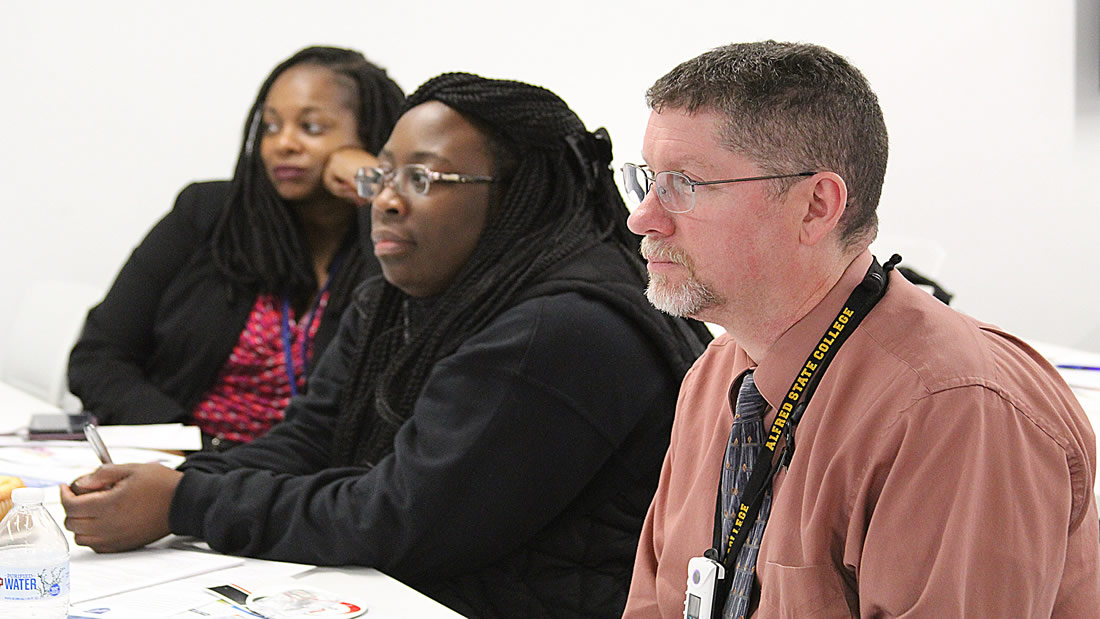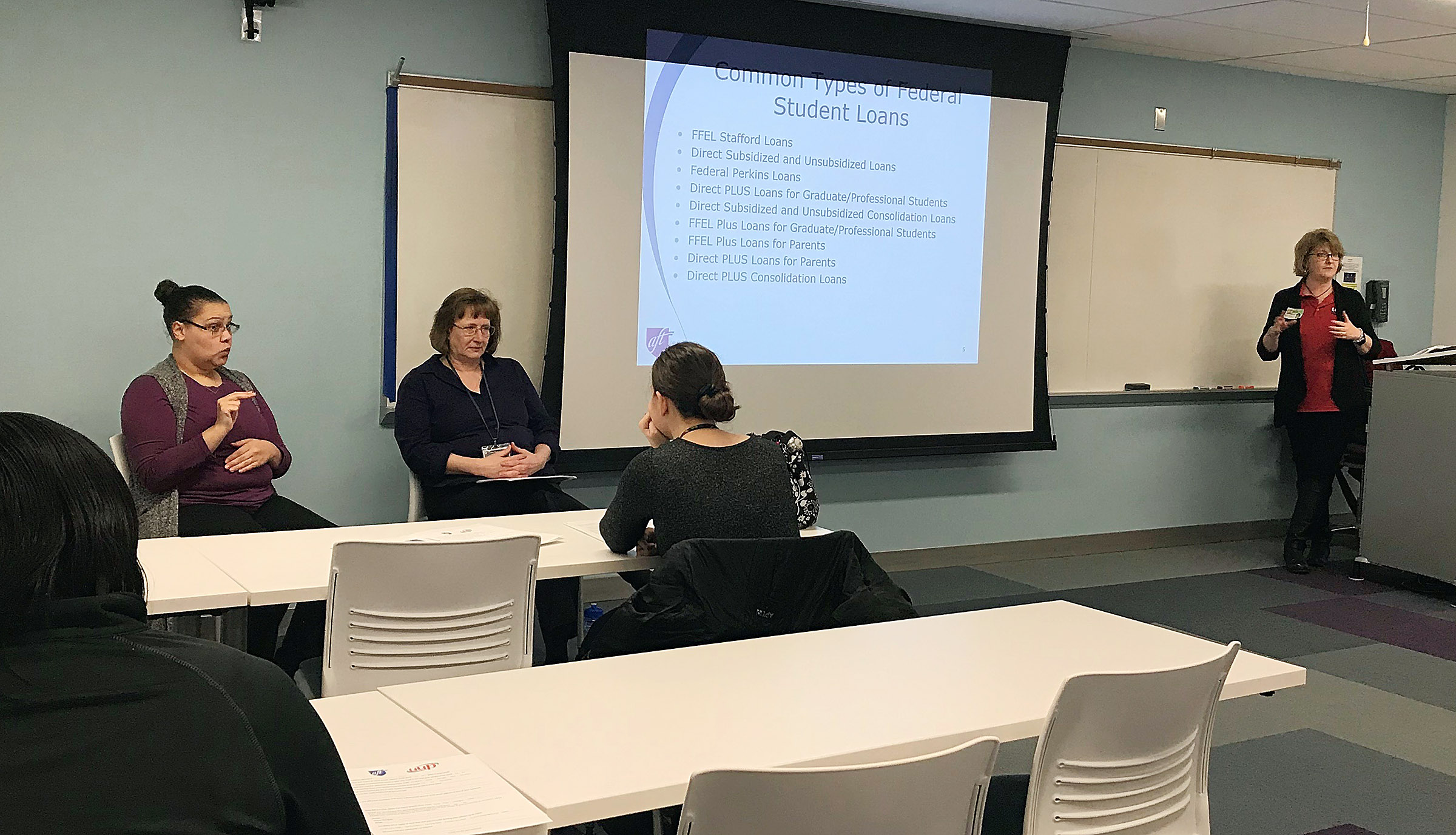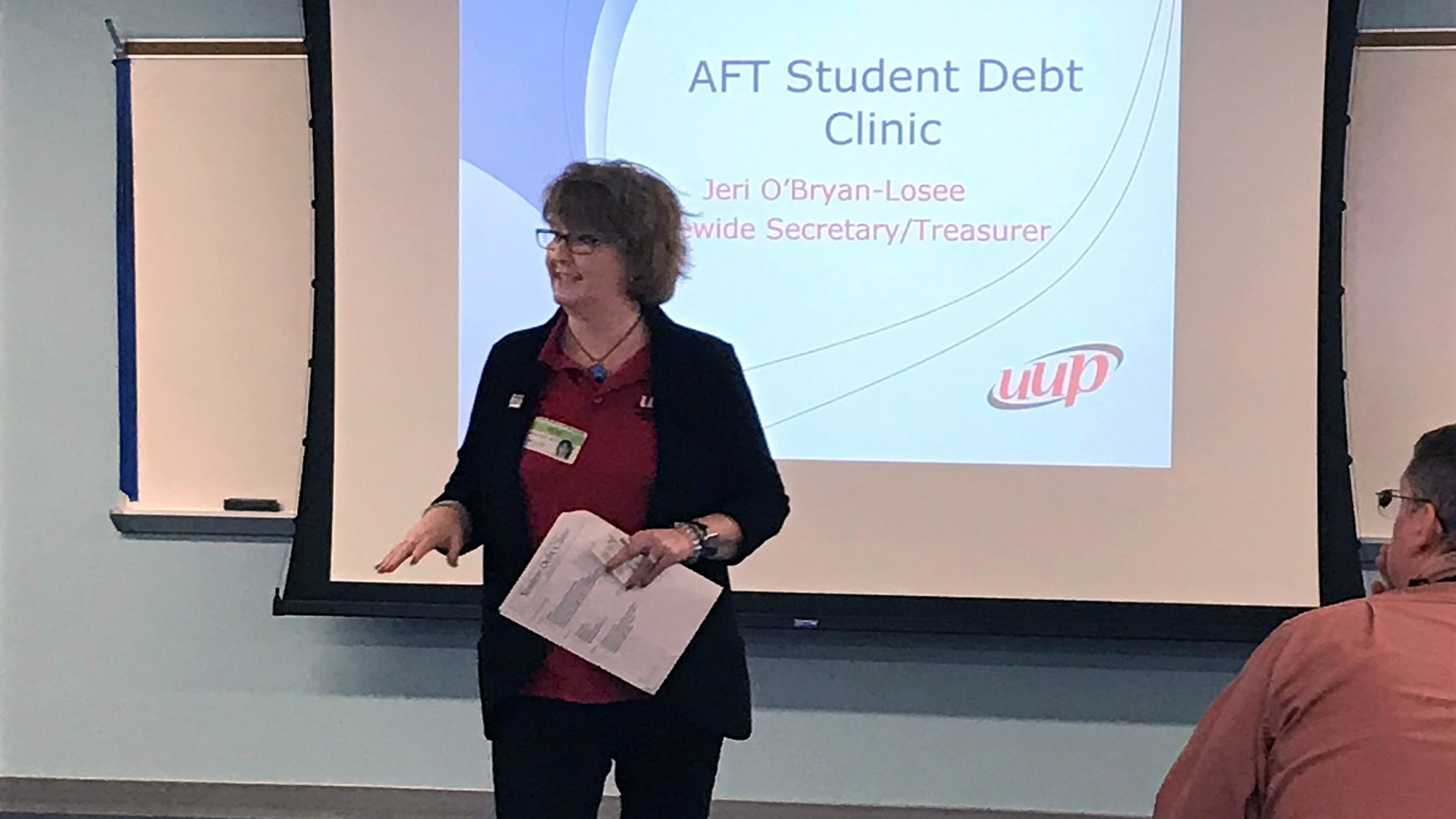January 24, 2020

When UUP Secretary/Treasurer Jeri O’Bryan-Losee heard about the American Federation of Teacher’s Student Debt Clinics, she knew it was a great opportunity to help UUP members most in need. She was the first UUP member to become a clinic trainer, and she has since steered the creation of UUP’s student debt clinic program, which included training 10 additional members and professional organizers as clinic presenters.
Student debt is the second-largest debt contributor for New Yorkers, exceeded only by mortgages, according to the Federal Reserve Bank of New York. Student debt in the United States has topped a staggering $1.5 trillion, with no sign of slowing.
UUP has made this topic a priority. More than 50 student debt clinics have been held at 21 chapters across the state since spring 2019, with several more scheduled this semester. In all, UUP has met with more than 500 members, providing them with useful tools and information about federal programs that can significantly lower monthly payments or completely forgive their debt.
At Upstate Medical University Chapter Jan. 23, UUP offered a student debt clinic as the first item on a daylong agenda of workshops for members, and made it the last item of the nearly 12-hour day—a daybreak-to-dusk schedule that highlighted the complex process of qualifying for the federal Public Service Loan Forgiveness (PSLF) program.

“When you hear about $1.5 trillion in outstanding student debt, it becomes obvious that the system is broken,” said O’Bryan-Losee, above right with Upstate Chapter members Melissa Griffin, left, and Sue Freeman, who took turns signing for clinic participants. “When you consider that more than 10 percent of borrowers are more than 90 days behind on payments, you see how this crisis is negatively affecting individuals and families.”
Previous UUP student debt clinics at Upstate were so popular that, in an effort to meet the need, the chapter held four student debt clinics spread out throughout the day to accommodate members’ shift schedules.
“We had a lot of information from members about student debt clinics filling up so fast that people couldn’t get a seat in one, so we decided we would run several in one day,” Chapter President Rich Veenstra said.
Joseph McDonald, a respiratory therapist, went to one of the student debt clinics because he thought he might pick up pointers helpful to his daughter, a student at SUNY Alfred. He took out a loan to help pay for her school.

“A student can’t borrow enough money to pay for college,” he said. “Parents are forced now to pick up loans.”
Facing more than $75,000 in personal student debt, O’Bryan-Losee is passionate about helping members find relief from the often-overwhelming burden of student debt.
“Our clinics give members the information they need to reduce or eliminate their student debt,” she said. “The effect this program has had on our members is more than I could have ever hoped for. We have more than a half dozen members who are well on their way to getting their student loans forgiven.”
At a student debt clinic at Empire State College last year, member Heather Shalhoub said she earned a full-tuition scholarship to Hofstra University, but still needed loans to cover books, housing and other college fees.
“Every option I was given was debt,” said Shalhoub, who was forced to transfer between Hofstra, Fulton-Montgomery Community College and the University at Albany when college costs became too prohibitive. She has $85,000 in student debt, and turned to UUP for answers.
The clinic “has made me better understand and be better informed about my options,” Shalhoub said.
The clinics also help to dispel myths often spread by student loan refinance companies.
“I receive misleading emails from student debt scam companies all the time,” said O’Bryan-Losee. “What many people don’t realize is that refinancing through these companies can often disqualify them from Public Service Loan Forgiveness eligibility.”
Questionable practices and misinformation campaigns remains a concern—one that UUP and its national affiliate continue to address. The AFT in October 2018 filed a lawsuit against Navient, one of the most prolific student loan servicers. The lawsuit claims the company has intentionally spread misinformation about the PSLF program, resulting in public service workers paying millions more than they should have.
This issue has also caught the attention of state leaders in Albany. In his 2020 State of the State address, Gov. Andrew Cuomo proposed legislation to increase regulation for debt collection companies. The legislation would give the Department of Financial Services the authority to license debt collection companies and investigate suspected abuses.
More clinics are scheduled for this semester:
- Feb. 4, 11 a.m., Delhi
- Feb. 5, 12:00 p.m., Purchase
- Feb. 11, 11:30 a.m., Binghamton
- Feb. 13, 12:30 p.m., Stony Brook
- March 24, 5 p.m., Cortland
- April 20, 12:30 p.m., Stony Brook
- May 5, 12:15 p.m. and 4:30 p.m., Buffalo State
- TBD, Purchase

